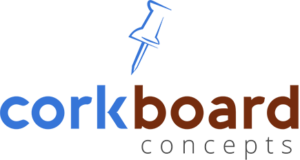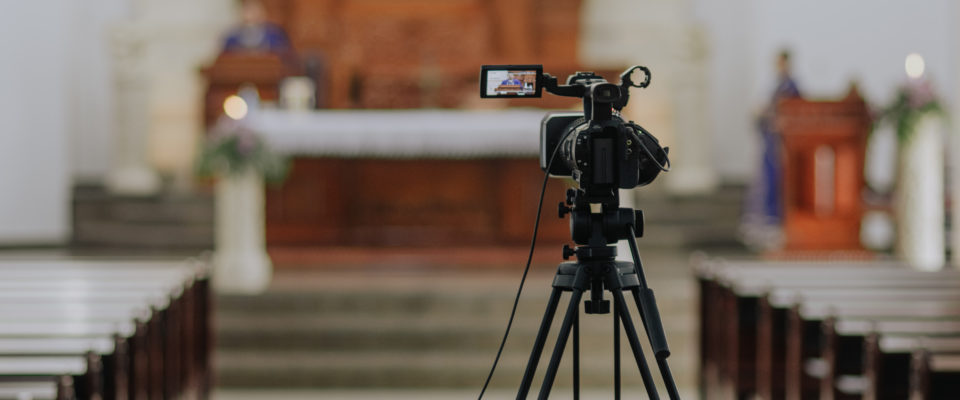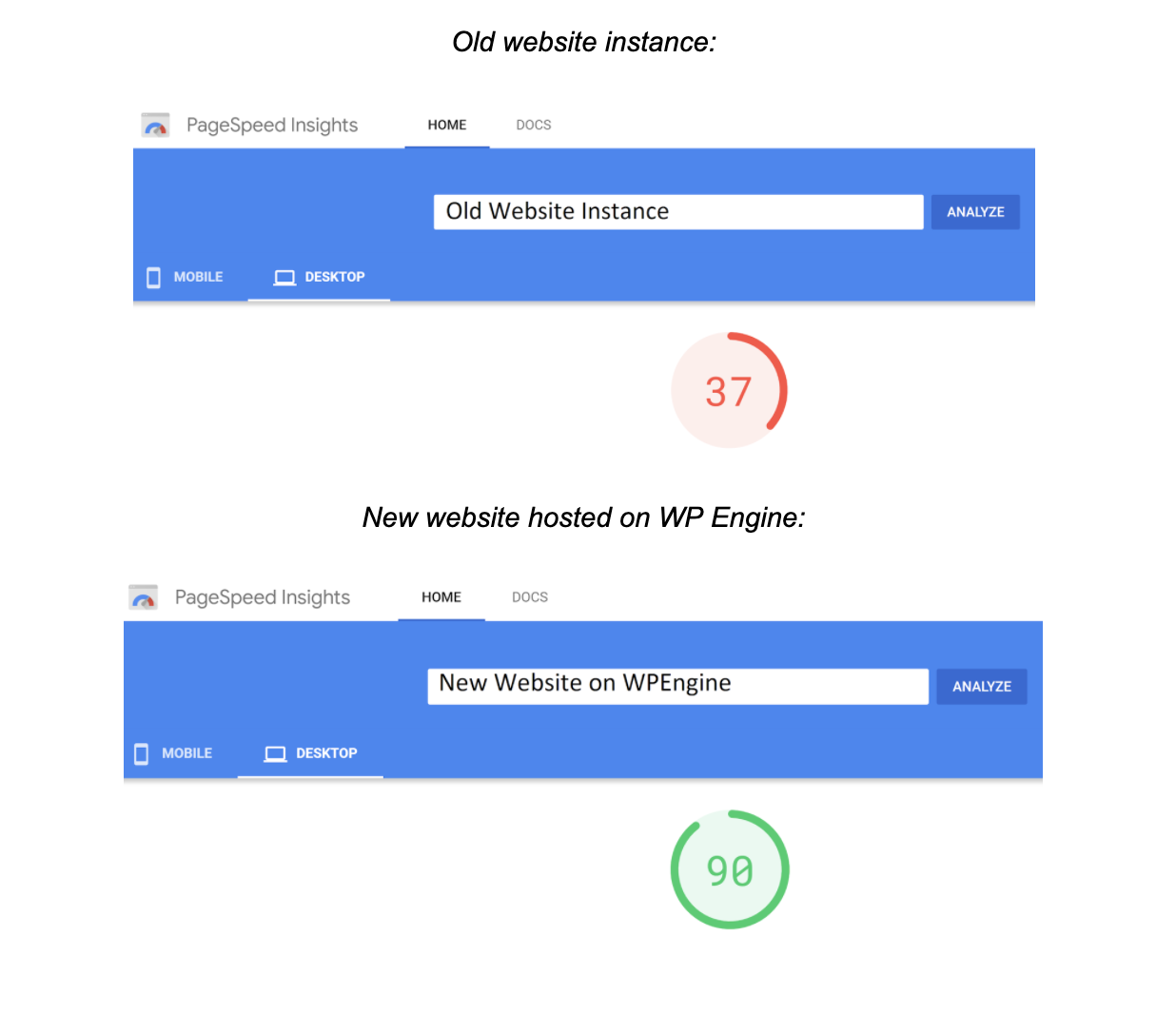

Industry: Digital Agency, Religious Organization
Site: https://corkboardconcepts.com/
Challenge: Quickly build and launch a website that could sustain high concurrent traffic and allow for church services to be held online, seamlessly.
Solution: WordPress-built website launched on WP Engine’s Premium Platform, equipped with dedicated architecture and real-time traffic monitoring.
Results: A rapidly-deployed digital experience that looks better, loads faster, and hasn’t dropped a single visitor request.


Corkboard Concepts is a strategic marketing agency with a digital and data-first mentality. Corkboard offers a wide variety of clients digital marketing services, SEO and SMM, creative services, and website development and management. As a WP Engine Agency Partner, Corkboard has access to a dedicated agency account team at WP Engine, which works through the agency’s specific project requirements to make sure all details are covered and every client is happy.
"Out of all the managed hosting providers we’ve worked with, WP Engine makes it the easiest to set up a server with such a quick turnaround."
—–Jordan Atchison, Marketing Strategist, Corkboard Concepts
A pandemic response with a tight deadline.
With the onset of Covid-19 and stay-at-home orders unfolding across the U.S., businesses and organizations of all sizes quickly began searching for creative solutions that would allow them to continue operating at a time of incredible uncertainty.
While challenges were widespread, especially during the chaotic first days and weeks of the pandemic, religious institutions, which traditionally rely on a physical location as a place of worship, were hit particularly hard.
With everything unfolding right before Palm Sunday and Easter, churches around the U.S. faced pressing decisions as to how they would approach the holidays, and how their parishioners would observe them.
It was against this backdrop that Pittsburgh-based digital agency Corkboard Concepts was tapped by a local diocese for help reimagining their online live broadcasts.
The diocese’s overarching goal was to ensure that anyone who wanted to attend an online church service could—and that an influx of visitors wouldn’t crash their site.
Diocese staff had already produced a live broadcast using their existing website and hosting provider, which had proven unsuccessful—nearly 40% of viewers who tried to join the service were unable to access it due to the high number of concurrent users that had overloaded the site’s server resources.
The team at Corkboard was brought in to overhaul the process, find a new solution that could supply the needed uptime, and do it all within a seven-day timeframe, before the next Sunday mass.
It wouldn’t be solved with a simple migration, either—the diocese legacy site had been built using SharePoint, and it had accumulated pages, content, and data spanning nearly two decades.
The legacy site was simply too large and cumbersome to pick up and move to a new server within the allotted time frame.
With the clock ticking, finding a solution that could support a high number of concurrent users took center stage.
While the rest of the site could be managed later on, the Corkboard team focused on finding a new hosting provider and building a separate digital property, where the live broadcasts could be easily accessed.
Provisioning a better hosting environment, fast.
The hosting part of the equation immediately presented its own challenges. While ~40,000 concurrent visitors had reached the site during the initial live broadcast, that number didn’t include all the visitors who tried to access the site but were unable to do so.
“We were tasked with building something that could sustain a large influx of simultaneous traffic, but we didn’t know exactly how much,” said Jordan Atchison, a Marketing Strategist at Corkboard Concepts.
At this point, the Corkboard team began working with their counterparts at WP Engine to provision a dedicated server that could handle a high number of concurrent requests, specifically for the live broadcasts.
“Out of all the managed hosting providers we’ve worked with, WP Engine makes it the easiest to set up a server with such a quick turnaround,” Atchison said.
“We had ruled out using a shared server from the start, even on the highest plans, because we wanted to be absolutely certain the site was equipped to handle any and all traffic spikes.”
The Corkboard team also set up live monitoring for high-traffic events, which provides regular logs of bandwidth, resource usage, and website hits in real-time from a dedicated team at WP Engine.
“This live support team was also authorized to increase resources if the event required,” said Atchison, “providing us with added peace of mind during the livestreams themselves.”
With the new server in place, and knowing that every page EXCEPT the home page and live broadcast page on the SharePoint site was not experiencing an overload of traffic, the Corkboard team went to work, building a default site experience on WordPress where the live broadcasts would live.
Once the initial set-up was completed, a splash page was created to serve as an impact shield for the traditional website, and it directed visitors to either the legacy site or the live broadcast feed that was set up on the newly-provisioned WP Engine server.
After this had culminated in a functional development site, the Corkboard and WP Engine teams began running it through stringent load testing, sending millions of requests to the site over a period of days to make sure it wouldn’t break.
Operating in the new norm: The outcome.
With only a couple of days to spare, the Corkboard team began final preparations for what would essentially be a hand-off of traffic from the legacy site to the newly-built experience.
“We also needed minimal downtime while making the switch from one to the other,” said Atchison.
“In order to do this, we established two instances of the website, creating a ww. for the traditional website experience which was maintained by the internal diocese IT team, and a www. that would be directed to our new site on WP Engine to handle the traffic.”
The switch was made in record time. Once the new site was live, the Corkboard team, with help from their dedicated team at WP Engine, also built out a full redirect list to seamlessly pass off organic, cached, and historic data, which took users from the www. pages that were not hosted on the new experience to the ww.
From there, it was off to the races. The upcoming Sunday mass came and went without issue, and since then, the new site hasn’t dropped a single visitor request.
Server logs for the new site were healthy, not only during the Sunday masses throughout Lent but also for the entire Easter week and Easter mass, which ended up being the diocese’s largest and most attended live broadcast of the year.
The new, WP Engine-hosted solution also increased the overall user experience by vastly improving load times, and it's set the diocese up for future success.

The transition from an in-location only service to a digital-inclusion approach is one the diocese plans on keeping in place going forward.
The quick response by Corkboard Concepts and WP Engine helped that transition go smoothly, and provided a scalable plan for the future.
“Being able to tap a partner like WP Engine really helped this project come together, especially on the tight timeline we had in place,” Atchison said.
“For agencies looking for that tight-knit connection with a technology provider that understands your challenges and who can really dive into the specifics of each one, look no further than WP Engine.”
A smarter way to WordPress hosting.
What will you build? Get started today with WP Engine.